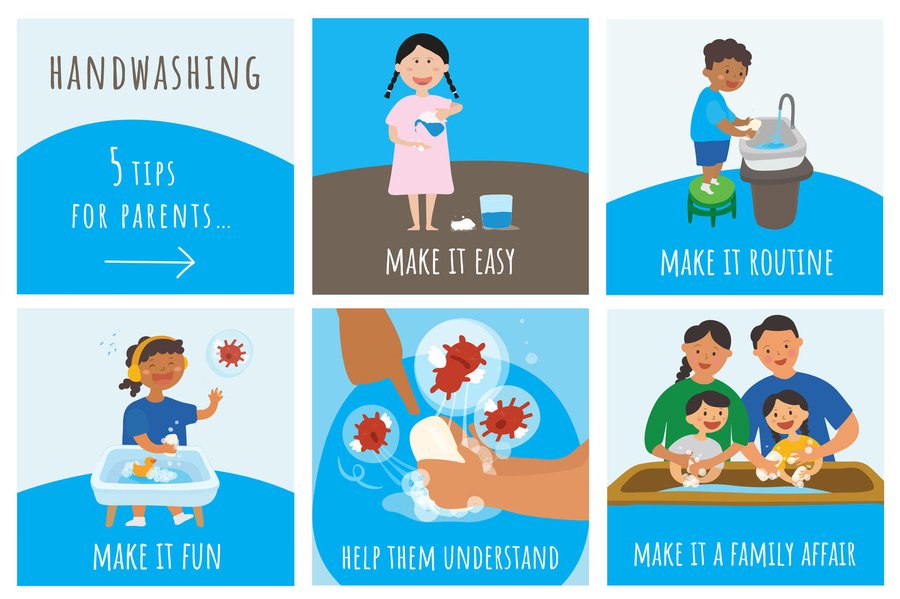On Global Handwashing Day, UNICEF warns that 3 in 10 people do not have basic handwashing facilities at home to fight off infectious diseases
Although handwashing with soap is
critical in the fight against infectious diseases, including COVID-19,
globally, around 3 in 10 people – or 2.3 billion – do not have handwashing
facilities with water and soap available at home. The situation is worst in the
least developed countries, with over 6 in 10 people without access to basic
hand hygiene, UNICEF warned on Global Handwashing Day.
“Global response efforts to the
pandemic have created an unprecedented time for hand hygiene. Yet progress
remains far too slow for the most vulnerable, underserved communities,” said
UNICEF WASH Director Kelly Ann Naylor. “Hand hygiene cannot be viewed as a temporary provision to manage
COVID-19. Further long-term investment in
water, sanitation and hygiene can help prevent the next health crisis from
coming. It also means fewer people falling ill with respiratory infections, fewer
children dying from diarrheal diseases, and more pregnant mothers and newborns protected
from preventable conditions like sepsis.”
The latest data show that some
progress has been achieved since 2015.For example, the global population with
access to basic hand hygiene at home has increased from 5 billion to 5.5
billion, or from 67 per cent to 71 per cent. However, if current trends
persist, 1.9 billion people will still not have access to basic hand hygiene by
the end of the decade.
According to the latest estimates:
· Globally, 3 in 10 people – or 2.3 billion –do not have access to basic
handwashing facilities with water and soap at home, including 670 million
people without any facility at all. In the least developed countries, more than
6 in 10 people lack basic hand hygiene facilities at home.
· 2 in 5 schools worldwide do not have basic hygiene services with water
and soap, affecting 818 million students, of which 462 million attend schools
with no facility at all. In the least developed countries, 7 out of 10 schools
have no place for children to wash their hands.
· 1 in 3 healthcare facilities worldwide does not have hand hygiene
facilities at points of care where the patient, healthcare worker, and treatment
involve contact with the patient.
· The cost to provide hand hygiene in all homes in 46 of the world’s
least-developed countries by 2030 is an estimated US$ 11 billion*. The cost to
governments for hygiene promotion are estimated to be equal to 25 cents per
capita per year.
Deep inequalities exist across and
within countries regarding access and progress, with the most vulnerable
children and families suffering the most. Moreover, in fragile,
conflict-affected, and refugee settings, progress is especially slow:
· In fragile contexts, 1 in 5 people do not have any hand hygiene facility
at home.
· In 8 out of 20 countries for which UNHCR has data, more than 30 per cent
of refugee households do not have access to soap.
· Globally, current progress rates must quadruple to reach universal
hygiene by 2030. In the least developed countries, the rate of progress would
need to increase ten-fold, and in fragile contexts, it would need to accelerate
by a factor of 23.
UNICEF urges governments to commit to
providing hand hygiene, not as a temporary response to the pandemic, but as an
investment in public health and economic resilience. The latest joint UNICEF
and WHO report identifies five accelerators that can enable governments to
rapidly scale up access to hand hygiene, including good governance, smart
public finance, capacity building, consistent data, and innovation.
#####
INDIA
The Government of India has invested
heavily in the water, sanitation and hygiene (WASH) sector under the mandates
of two national flagship programmes: the Swachh Bharat Mission, for sanitation
and hygiene, and the Jal Jeevan Mission, for safely managed drinking
water through functional house tap connections.
Government initiatives that
strengthen local self-governance have also focused on handwashing as a priority
intervention under all these initiatives, including in schools,
Anganwadi Centres and other public institutions, especially in response to the
COVID-19 pandemic. In this context, the 100 days campaign is being implemented
by the government to ensure piped water supply in every school, anganwadi
centre and ashramshala in the country.
As technical partners, UNICEF has
been working with the central and state governments to raise
awareness on and generate demand for hand hygiene, to install
accessible COVID-19 sensitive handwashing stations (hand touch free),
in the institutions and public places along with promoting COVID
appropriate behaviours, especially handwashing with soap.
According to Joint Monitoring
Programme2020 supported by UNICEF and WHO, over 30% of Indians do not
have access to handwashing facilities with water and soap at home, and
almost half of schools also experience the same deprivation. Significant gains
in promoting handwashing access and practice have been made especially in the
past two years, mainly due to the strong COVID-19 response efforts led by the
government and supported by partners. However, this needs sustained
effort, given the large population, diversity of the country, the large
investment needed, and the possibility of waning interest as the severity of
the pandemic waves recede.
Handwashing with
soap, has to remain a priority and become ‘everyone’s business’ with multisectoral
stakeholder involvement, to ensure good hygiene practices towards better public
health with a dedicated plan to increase the hand washing practices.
* This estimate assumes that households
would bear the cost of installing handwashing facilities and the cost
associated with purchasing water and soap. Governments would bear the cost of
hygiene promotion, both initial and ‘top-up’.
Least Developed Countries: Afghanistan,
Angola, Bangladesh, Benin, Bhutan, Burkina Faso, Burundi, Cambodia, Central
African Republic, Chad, Comoros, Democratic Republic of the Congo, Djibouti,
Eritrea, Ethiopia, Gambia, Guinea, Guinea-Bissau, Haiti, Kiribati, Lao People’s
Democratic Republic, Lesotho, Liberia, Madagascar, Malawi, Mali, Mauritania,
Mozambique, Myanmar, Nepal, Niger, Rwanda, Sao Tome and Principe, Senegal,
Sierra Leone, Solomon Islands, Somalia, South Sudan, Sudan, Timor-Leste, Togo,
Tuvalu, Uganda, United Republic of Tanzania, Yemen, Zambia


